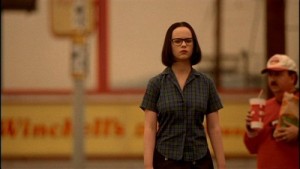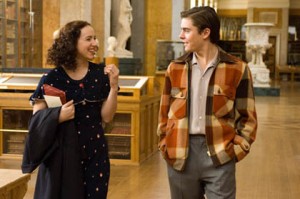 Groucho Marx and Helen Traubel sing a duet from The Mikado, originally telecast on The Bell Telephone Hour in 1960:
Groucho Marx and Helen Traubel sing a duet from The Mikado, originally telecast on The Bell Telephone Hour in 1960:
(This is the latest in a series of arts-related videos that appear in this space each Monday and Wednesday.)
Terry Teachout on the arts in New York City
In today’s Wall Street Journal I review two new off-Broadway plays, Pocatello and Every Brilliant Thing. Here’s an excerpt.
* * *
Originality is overrated. Even the most hackneyed-sounding plot can be made fresh by a writer who understands that life is always the same—and always new. That’s the secret of Samuel D. Hunter’s “Pocatello,” a 10-character drama about a pair of severely fractured families that covers its well-tilled ground in a way that is at once predictable and involving, not to mention poignant. To be sure, it’s also well acted and directed, but don’t be fooled by the high quality of Playwrights Horizons’ production: “Pocatello” is a fine play in its own right.
 “Pocatello” takes place in the dining room of an Olive Garden-type Italian restaurant located in a small Idaho town that is growing smaller and seedier by the day. Eddie (T.R. Knight), the manager, is a gay singleton whose own family long ago gave up on getting along but who still dreams of bringing its estranged members together again, even though none of them shows any sign of wanting to be reunited. He also has a second workplace family that is closer and more sympathetic, but it, too, is in trouble, for the restaurant isn’t doing enough business to keep its doors open for much longer….
“Pocatello” takes place in the dining room of an Olive Garden-type Italian restaurant located in a small Idaho town that is growing smaller and seedier by the day. Eddie (T.R. Knight), the manager, is a gay singleton whose own family long ago gave up on getting along but who still dreams of bringing its estranged members together again, even though none of them shows any sign of wanting to be reunited. He also has a second workplace family that is closer and more sympathetic, but it, too, is in trouble, for the restaurant isn’t doing enough business to keep its doors open for much longer….
Mr. Hunter’s characters all sound like real people with real problems, the kind with which you yourself are currently wrestling or have very likely wrestled at some point in the not-too-distant past….
Duncan Macmillan’s “Every Brilliant Thing,” which has transferred to an off-Broadway house after successful runs in London and Edinburgh, is an hour-long one-man comedy about depression. The sweet-and-sour premise is that the narrator has drawn up a million-item list of “brilliant” things that he likes, loves, admires or appreciates (“321. Laughing so hard you shoot milk out of your nose”) in the hope of persuading his suicidal mother—and himself—that life is worth living.
The list itself is twee and greeting-cardy and the script as a whole is close enough in tone to Nick Hornby’s “High Fidelity” to make alert viewers squirm, but the show works, mostly because of the battering-ram energy of Jonny Donahoe, the British stand-up comedian who performs “Every Brilliant Thing” in the round on a toenail-sized stage and is also credited as its co-author….
* * *
To read my review of Pocatello, go here.
To read my review of Every Brilliant Thing, go here.
In today’s Wall Street Journal “Sightings” column I look at the long career of Horton Foote, who struggled in obscurity for decades before establishing himself as a major playwright. Here’s an excerpt.
* * *
Horton Foote’s “The Traveling Lady” opened on Broadway in October of 1954 and closed three weeks later. Forty-three years later, “The Young Man from Atlanta” made it to Broadway after having had a solid off-Broadway run and won the Pulitzer Prize. In between…nothing. Not only were none of Foote’s three dozen other plays produced on Broadway during that time, but none of them received major productions anywhere in America between 1954 and 1984. Yet by the time he died in 2009 at the august age of 92, he was recognized as one of this country’s greatest playwrights, and today everyone in the world of theater knows and esteems his work.
 Last September, Marion Castleberry, a professor of theater arts at Baylor University, brought out “Blessed Assurance: The Life and Art of Horton Foote,” a richly comprehending biography that tells you everything you need to know about the author of “The Trip to Bountiful,” the 1952 play that first brought Foote’s name to the attention of the general public. But because “Blessed Assurance” was brought out by Georgia’s Mercer University Press, not a New York-based trade publisher, it failed to receive the recognition it deserved. As a result, few of Foote’s admirers know of its existence, much less that it answers a question that had long puzzled me: How did he stay afloat during the long, cruelly demoralizing years of obscurity? What kept him at work day after day, writing the plays that would secure his reputation as a great dramatic artist?
Last September, Marion Castleberry, a professor of theater arts at Baylor University, brought out “Blessed Assurance: The Life and Art of Horton Foote,” a richly comprehending biography that tells you everything you need to know about the author of “The Trip to Bountiful,” the 1952 play that first brought Foote’s name to the attention of the general public. But because “Blessed Assurance” was brought out by Georgia’s Mercer University Press, not a New York-based trade publisher, it failed to receive the recognition it deserved. As a result, few of Foote’s admirers know of its existence, much less that it answers a question that had long puzzled me: How did he stay afloat during the long, cruelly demoralizing years of obscurity? What kept him at work day after day, writing the plays that would secure his reputation as a great dramatic artist?
The answer is that Foote, for all his oft-remarked gentleness of manner, was an extraordinarily determined man who persisted in believing in his own talent when everyone else doubted it….
* * *
Read the whole thing here.
A rare kinescope of the Studio One version of Horton Foote’s The Traveling Lady, starring Kim Stanley, directed by Robert Mulligan, and telecast on CBS in 1957:
 “Skepticism like chastity should not be relinquished too readily. Indeed skepticism is the chastity of the intellect and it is shameful to surrender it too soon or to the first comer. There is nobility in preserving it coolly and proudly through long youth until at last, when instinct and discretion have ripened, it can be safely exchanged for fidelity of outlook and for happiness.”
“Skepticism like chastity should not be relinquished too readily. Indeed skepticism is the chastity of the intellect and it is shameful to surrender it too soon or to the first comer. There is nobility in preserving it coolly and proudly through long youth until at last, when instinct and discretion have ripened, it can be safely exchanged for fidelity of outlook and for happiness.”
George Santayana, Skepticism and Animal Faith: Introduction to a System of Philosophy
I wrote about Norman Lear’s recently published autobiography for the January issue of Commentary:
Throughout much of the 1970s, Norman Lear was the most powerful TV producer in Hollywood. He created a string of situation comedies so successful that five of them, All in the Family, Good Times, The Jeffersons, Maude, and Sanford and Son, were in the top 10 in the final week of the 1974–75 season. In 1983, he was one of the first seven people to be inducted into the Television Academy Hall of Fame, together with Lucille Ball, Paddy Chayefsky, Milton Berle, Edward R. Murrow, William S. Paley, and David Sarnoff—a sign of how seriously he had come to be taken.
By 1985, though, all of Lear’s series had been canceled, and none of them is shown widely in syndication today. Even Archie Bunker, the working-class anti-hero of All in the Family, whose name was for years synonymous with the blue-collar prejudices that the show was created to satirize, has long since faded from the common stock of American cultural reference.
No species of fame is as fleeting as the sort bestowed by network TV. But Lear fell further, faster, and more fully than most, and it is noteworthy that he has nothing to say about this descent in his newly published autobiography, Even This I Get to Experience, in which he is fairly forthcoming about most other aspects of his long and eventful life (he is 92 years old). One might well come away with the impression that he simply lost interest in television and decided to pursue other interests were it not for the fact that between 1991 and 1994, he created and produced two more sitcoms, both of them flops that were canceled after a half-dozen episodes each.
Such, of course, is the final fate of all TV producers, no matter how successful their series may be. Sooner or later—usually sooner—they lose touch with popular taste. But Lear’s brief period of domination over the airwaves was so complete that it is worth considering why it ended when it did. Did he simply run out of creative steam? Or was American culture changing in ways that he no longer understood?…
Read the whole thing here.
Not having advanced technologically to the point of being able to suck movies from the Web, Mrs. T and I usually bring a varied assortment of DVDs with us whenever we’re going anywhere for a long stay. We’re going to be in Florida for two months, so we decided that it might be wise to pack a larger-than-usual selection this year. Here’s what I stowed in the suitcase. As was the case with the books I brought on our trip, some of these films are new to me and some not:
Baby, the Rain Must Fall (since Horton Foote has been on my mind of late)
Children of Paradise
Frances Ha
 Ghost World
Ghost World
The Grand Budapest Hotel and Letter from an Unknown Woman (to suit my Stefan Zweig mood)
Honeymoon in Vegas (for homework—I’ve never seen the film and I’m prepping to review the Broadway stage version)
Junebug
Noah Baumbach’s Kicking and Screaming
The Last Picture Show
The Life and Death of Colonel Blimp (David Mamet’s favorite movie, which we watched with undiminished pleasure on New Year’s Eve)
Local Hero
Margaret (in honor of the Broadway run of Kenneth Lonergan’s This Is Our Youth)
 Me and Orson Welles (a continuation of our Zoe Kazan film festival)
Me and Orson Welles (a continuation of our Zoe Kazan film festival)
Moonrise Kingdom
Henry Bromell’s Panic (one of the most underrated films of the past quarter-century)
Passion Fish
Silver Linings Playbook
Sunshine State (we’re in Florida, right?)
There Will Be Blood
Between that stash (which I’ll replenish as needed when I fly up to New York later this month) and TCM, I’d say we’re good for at least a month.
Here’s my list of recommended Broadway, off-Broadway, and out-of-town shows, updated weekly. In all cases, I gave these shows favorable reviews (if sometimes qualifiedly so) in The Wall Street Journal when they opened. For more information, click on the title.
BROADWAY:
• Cabaret (musical, PG-13/R, all performances sold out last week, closes Mar. 29, reviewed here)
• The Elephant Man (drama, PG-13, contains partial nudity, virtually all performances sold out last week, closes Feb. 22, reviewed here)
 • A Gentleman’s Guide to Love & Murder (musical, PG-13, all performances sold out last week, reviewed here)
• A Gentleman’s Guide to Love & Murder (musical, PG-13, all performances sold out last week, reviewed here)
• Matilda (musical, G, most performances sold out last week, reviewed here)
• Les Misérables (musical, G, too long and complicated for young children, reviewed here)
• On the Town (musical, G, contains double entendres that will not be intelligible to children, reviewed here)
OFF BROADWAY:
• The Fantasticks (musical, G, suitable for children capable of enjoying a love story, reviewed here)
CLOSING NEXT WEEK IN WEST PALM BEACH, FLA.:
• My Old Lady (drama, PG-13, closes Jan. 11, reviewed here)
CLOSING SUNDAY ON BROADWAY:
• Once (musical, G/PG-13, all performances sold out last week, reviewed here)
• This Is Our Youth (drama, PG-13, reviewed here)
| M | T | W | T | F | S | S |
|---|---|---|---|---|---|---|
| 1 | 2 | 3 | 4 | |||
| 5 | 6 | 7 | 8 | 9 | 10 | 11 |
| 12 | 13 | 14 | 15 | 16 | 17 | 18 |
| 19 | 20 | 21 | 22 | 23 | 24 | 25 |
| 26 | 27 | 28 | 29 | 30 | 31 | |
An ArtsJournal Blog